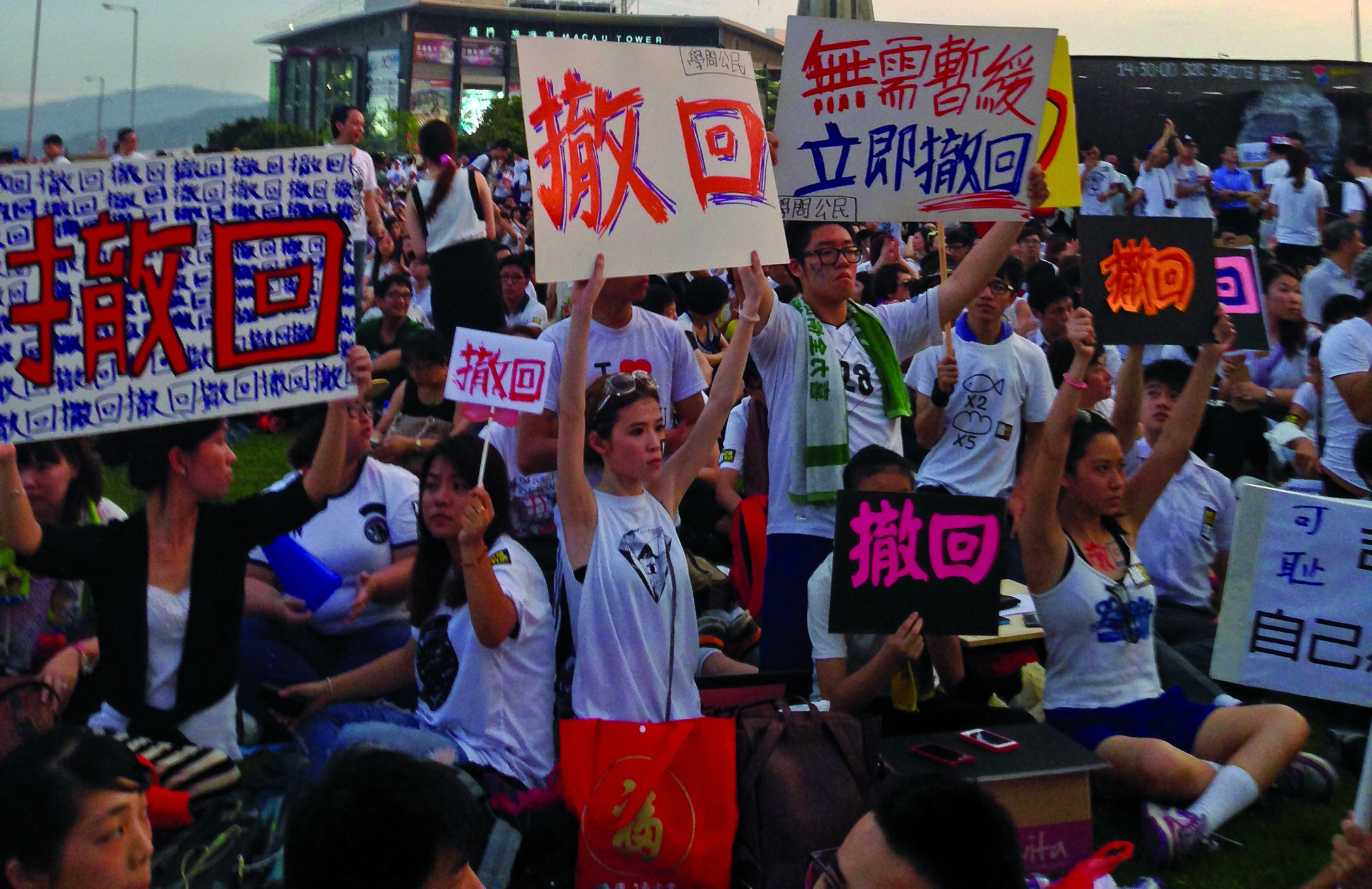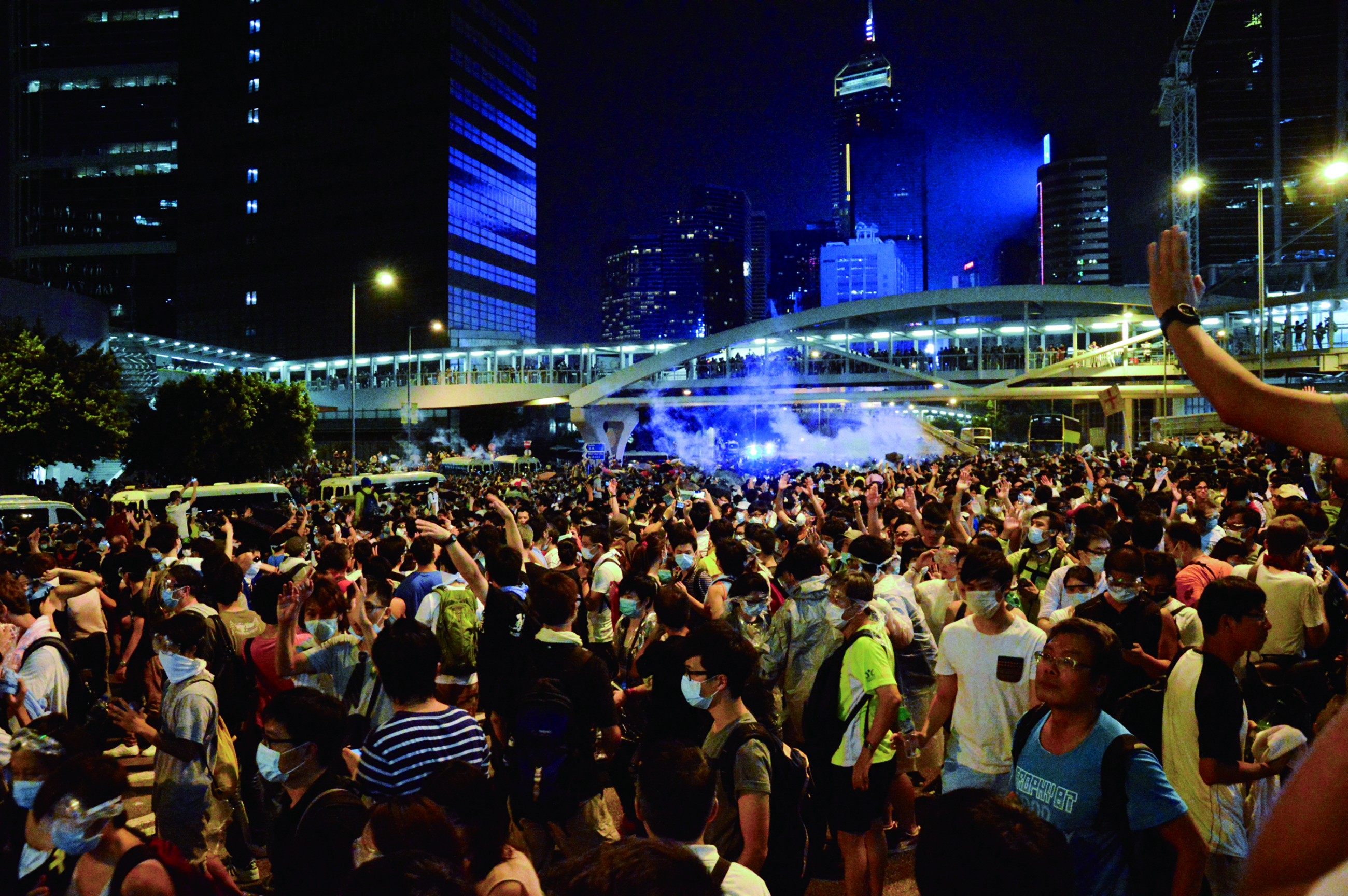Civil society starts to assert itself in gambling enclave
By Grace Cheung and Agnes Ng
“Support Hong Kong!” “Shame on the police for using violence!”
These were the slogans chanted by around 1,000 people who had gathered in Macau’s Friendship Square on China’s National Day to show their solidarity with the protesters of the Occupy movement in Hong Kong, then four days into their sit-in to demand true universal suffrage for Hong Kong.
The residents of the former Portuguese colony, which is about an hour’s ferry ride from Hong Kong, are increasingly vocal about their desire to have a greater say in choosing their top leader. They may not be ready for an Occupy movement like Hong Kong, but they are seeking changes to the enclave’s political structure.
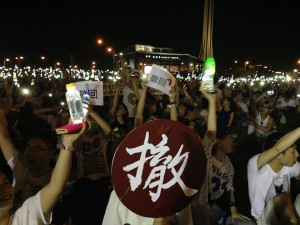
On May 25 this year, more than 20,000 outraged Macau citizens from all walks of life protested against a controversial government bill that would have rewarded the outgoing Chief Executive and senior officials with lavish retirement packages. What caught the attention of the local community and beyond was not just that the Macau Chief Executive Fernando Chui Sai-on would attempt to quickly push through such a contentious bill without consultation, but also the unprecedented public outcry.
Since sovereignty over Macau was transferred to China in 1999, the special administrative region’s Chief Executive has been chosen by a committee that heavily favours business interests and is deferential to the Chinese government.
There has been limited political reform. In 2012, the Macau Legislative Assembly passed a reform bill, which added two directly elected seats to the 29-member body. But critics considered these additional seats to be “cancelled out” by two additional indirectly elected functional constituency seats. Together with seven appointed members, this brought the total number of lawmakers to 33. The bill also added 100 members to the 300-strong election committee to vote for the Chief Executive. It was widely seen as a setback for democratic progress.
It is within this context that the May 25 protest was seen as a glimmer of hope for the development of civil society in Macau. In recent years, there has been growing dissatisfaction with the declining quality of life for ordinary people despite constant growth in the economy. The retirement package bill, which would have further enriched top leaders, was the straw that broke the camel’s back and drove people onto the streets. More and more people are beginning to question the political system and the leadership.
The unprecedented show of opposition forced Chui to back down and shelve the bill. It was a triumph for people power but some have questioned how sustainable the sudden flowering of civil society will be. One of the hurdles to overcome is the conservative political culture in Macau.
Sulu Sou Ka-hou, who is just 23, is the president of the New Macau Association, which was founded in 1992 and is the enclave’s most prominent pro-democracy organisation. Sou says that, compared to Hong Kong’s civil society development, Macau is at least 10 years behind.
Sou says the Macanese are so used to maintaining a harmonious environment that it has become an impediment to the city’s democratic development.
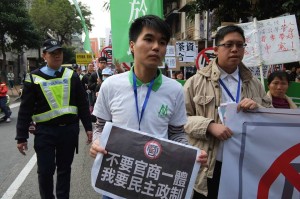
“I think Macau now is similar to Hong Kong in 2003. People have little experience in standing up to the government,” he says. “In 2014, Hongkongers are prepared to storm the Legislative Council and participate in Occupy Central, but if it were 2003, no one would do either of those things.”
Jason Chao Teng-hei, 27, president of Open Macau Society, a non-government organisation advocating social equality, openness, and civil society in Macau, says the Macanese traditionally value personal connections and, in times of conflict, they opt for peaceful negotiations, if not compromises, instead of adopting “adversarial means” or confrontations. In order to not offend the people around them, they tend to be submissive and low-profile, not daring to challenge the authorities even if injustice prevails in their community.
According to Chao, what most people are concerned about is their standard of living, and that can only be guaranteed through a stable job, and well-established social networks. “Unlike Hong Kong people, they are not enlightened enough to realise the link between safeguarding their livelihood and fighting for democracy,” Chao says, “and therefore we ought to show them the link.”
Keen to give Macau people a taste of exercising their civil rights, Chao co-organised an unofficial referendum in August in which eligible voters were asked whether they had confidence in Chui and whether they thought the next Chief Executive should be elected by universal suffrage in 2019.
The poll came under intense pressure, with cyberattacks and the arrest of five activists, including Chao, for allegedly breaching the privacy law. In the end, around 8,700 of Macau’s 624,000 eligible voters took part in the poll, with close to 90 per cent of them saying they had no confidence in Chui and 95 per cent of them backing universal suffrage. The turnout might not compare with Hong Kong’s June 22 civil referendum on the nomination method for Chief Executive candidates, but organisers say what matters most is the educational purpose of the exercise.
“Before driving the general public to fight for it [universal suffrage], we have to let the people know how good it is by letting them experience how it operates and how they can cast their vote,” Chao says.
As people become more vocal in articulating their demands, the authorities are hitting back. During the referendum, Roy Choi Chi-chio, the vice-president of Macau Concealers, a satirical online newspaper mocking the name of the most prominent and pro-establishment newspaper, Macao Daily News, and a journalist colleague were arrested for their coverage of the event.
Choi sees his arrest as an example of political persecution. Despite limited press freedom, he believes the media has an important role to play in propelling social movements by disseminating information about political movements and mobilising the public. “In the past, many netizens actually expressed their desire to take to the street but most attempts failed as nobody took the lead,” Choi says, “But now, we [new media] play a significant role in steering them in the right direction.”
Gino Lei Cheong-hou, a journalist at All About Macau Media, another leading independent online newspaper, notes the difficulties in conveying messages about politics and democracy across the digital divide. “The youngsters will definitely use Facebook but in order to reach the older generation, we need to print a paper version,” he says. “But we’re now facing the problems of high costs and a heavy workload.”
What makes the media scene in Macau more challenging than in Hong Kong is that the majority of the traditional media is subsidised by the government, and censorship is rife.
Media censorship on politically sensitive issues has contributed to political apathy and an immature public sphere. Meanwhile the pressure on academics and intellectuals adds to the difficulties in developing a diverse and vibrant civil society.
Yu Wai-ying, a self-proclaimed “recalcitrant” journalist at a non-mainstream traditional newspaper thinks professionalism is an important component of a civil society. Yu himself insists on balanced reporting and says professional opinions from scholars and various interest groups can help encourage debate on government policies. Yet he believes that fewer than 10 per cent of the scholars and intellectuals in Macau are willing to do this.
“Owing to the absence of professional advice and university scholars, it is hard for civil society to flourish,” says Yu.
Academic freedom in Macau has been hit hard by the ousting of an academic and a secondary school teacher, reportedly over their links to pro-democratic causes. Bill Chou Kwok-ping, a former associate professor at the University of Macau, was suspended from work after a university investigation ruled he had tried to impose his political beliefs on students, failed to provide different perspectives in class and discriminated against students. The university then refused to renew his contract. Chou said he was not told why, but he believes it was a result of his political stance.
Feeling pessimistic about intellectual freedom in the city, Chou says “depoliticisation” is ubiquitous in Macau, and discussion on political topics like freedom and electoral reforms with students is sort of a taboo. “The repression in Macau is far worse than in Hong Kong. At least no scholars have been sacked [due to their political participation] in Hong Kong,” says Chou.
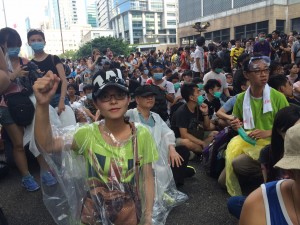
Kam Sut-leng, who is in her 30s, is a teacher and a social activist with the group Macau Youth Dynamics. She was suddenly dismissed from her job last year by Sacred Heart Canossian College (English Section) without any valid explanation. The school refused to comment on the incident when Varsity made enquiries.
Kam says primary and secondary schools in Macau seldom touch upon politics. Although “Civic Education” is included in the curriculum, the course syllabus does not touch upon constitutional development or civil rights. But, as a teacher, Kam feels she has a responsibility to inspire her students to care more about society.
Although most Macau students are not so engaged in social issues, there are some who break free from the rigid education system to participate in social movements, such as Bosco Wong Kin-long, a year one student from Macau studying government and public administration at the Chinese University of Hong Kong.
Wong considers his stay in Hong Kong to be a mission to gain experience in the development of civil society. And he managed to experience a civil disobedience movement personally when he joined the tens of thousands of Occupy Hong Kong protesters.
”I am touched by how Hong Kong people voluntarily take to the streets to strive for their own rights, with the whole movement being so disciplined and orderly,” Wong says.
Kam sees this Occupy movement as a lesson in civic education which provides Macau people with the opportunity to reflect on the situation in their city by looking at what is happening in Hong Kong. ”If we Macau citizens see that Hong Kong cannot have genuine universal suffrage, we can imagine that it would be hard for us to have it.”
Even as Hongkongers ponder the path they will take on the road towards achieving greater democracy, their cousins across the water in Macau will be watching closely and taking notes.
Edited by Katrina Lee









































